Britain’s referendum on European Union (EU) membership will be held on June 23rd.
The latest polling information for the ‘Brexit’ campaign can be found below.
22 June (part 2): Online TNS poll drops Leave four points to 43 per cent, still a two point lead over Remain
When the same methodology as previous polls from TNS is used, taking account of likelihood to vote, the Leave camp’s lead extends to seven points.
22 June: Opinium online poll lifts Leave one point to 45 per cent, leading Remain stuck on 44
Opinium Research conducted the online survey of 3,011 UK adults, a larger than usual sample, from 20 to 22 June.
On 12 June Opinium gave Remain 44 per cent, a two point lead over Leave.
On 18 June the same pollster had both camps on 44 per cent.
21 June (part 4): Survation phone poll gives Leave two point boost, Remain lead cut to one point
Survation’s latest telephone poll, on behalf of IG, reports that Remain is stuck on 45 per cent while Leave has risen by two points to 44 per cent. The fieldwork was done on 20 June, after the killing of Jo Cox MP.
Excluding Undecided voters, the headline results are: Leave on 49 per cent (up 1.5 points compared to last Survation poll), Remain on 51 per cent (down 1.5).
21 June (part 3): YouGov poll gives Leave a two point lead – ‘There has been a move toward Remain, but it might not be enough’
The latest online poll for The Times, conducted between 17 and 19 June, gives the Leave campaign 44 per cent — a two point lead over Remain. Excluding those who do not know or will not vote still gives Leave a two point lead at 51 per cent.
A poll conducted by YouGov between 16 and 17 June had given Remain a one point lead (44 to 43), rising to two (51 to 49) when excluding those who do not know or will not vote.
According to YouGov analysis the two point lead for Leave is within the margin of error of The Sunday Times poll, which showed a one point lead for Remain. Freddie Sayers, Editor-in-Chief of YouGov, notes:
For those trying to identify momentum, to tell “the story” of the campaign, it must be frustrating: having recorded a surge towards Brexit, we now show the campaigns roughly neck and neck again, where they have been for most of the past three months.
Mr. Sayers also said that “despite similarities, this campaign is not simply the Scottish referendum all over again,” continuing:
Many political observers, asked to predict Thursday’s vote tally, will venture 55-45 in favour of Remain, perhaps because that’s what happened in Scotland.
At YouGov we have also long been expecting a movement to safety in the final days, which is what we saw in Scotland in the two weeks before the vote.
The already-recorded movement back towards Remain is evidence that it is happening, and it could move dramatically further on the day.
But this time it may still not be enough. The starting point is different – we never showed leads of seven points for the Scottish Yes campaign – and there appears to be less fear.
Only 27 per cent of people in today’s poll think they will be financially worse off in the event of Brexit, compared with 42 per cent of Scots before the Independence referendum.
The EU is an altogether more distant, abstract, recent concept than the UK, and life outside it feels like less of a scary change.
The fear factor is present to some extent – 31 per cent of Leave voters think that voting to leave the EU is risky, but plan to do it anyway, and 14 per cent of Leave voters told us they would feel “nervous” waking up the next day and discovering we had left the EU.
But should these be treated as “soft” Leave voters? When you ask them straight up if they might change their minds on the day, only a tiny percentage think that they will. We’d expect some more movement towards the safer option, but there is no evidence that it will be as dramatic as in Scotland.
21 June (part 2): Telegraph’s ORB phone poll gives 7 point lead to Remain, reversing their 1 point deficit from last week
An ORB poll for the Telegraph newspaper found support for Remain among those who will definitely vote at 53 per cent, up 5 points on the previous one, with support for Leave on 46 per cent, down three. This represents an eight point net reversal from last week, when Leave held a one point lead among definite voters with 49 per cent to Remain’s 48.
Sir Lynton Crosby, the polling guru credited with helping the Conservative Party to win the 2015 general election, noted:
The last time Remain had such a large lead among those certain to vote was almost exactly one month ago, when it attracted 55 per cent of definite voters and enjoyed a net lead of 13 points.
Among all voters, however, the picture is slightly different. This week Remain is stable, attracting 49 per cent of the vote share among the entire electorate, while Leave has increased its share by 3 points to 47 per cent.
Remain’s net lead is now down to 2 per cent, the smallest it has been since this ORB poll series began in March.
He added: “All the signs of ORB’s latest and final poll point to a referendum that will truly come down to the wire,” warning, however, that the Leave campaign has “failed to quash the almost ubiquitous perception that it is the riskier of the two options.”
21 June: Britain’s largest independent social research agency confirms vote is on a knife edge
From Nat Cen:
A unique survey of voting intentions in the EU referendum conducted by NatCen suggests that the outcome of the referendum is on a knife-edge and is likely to fall in between the divergent outcomes being anticipated by phone and internet polls.
Conducted both over the internet and by phone with a randomly selected sample of respondents the survey, published today, estimates that at the time that it was conducted, between mid-May and mid-June, support for Remain stood at 53% while 47% backed Leave.
However, a vote of 50% each lies within the survey’s statistical margin of error and, even leaving aside the possibility of a late swing, the possibility of a majority for Leave cannot be ruled out.
The estimate of 53% for Remain, 47% for Leave lies in between the average level of support for Remain and Leave being produced by internet and phone polls when most of the interviewing for the NatCen survey was conducted. During the last two weeks of May the average level of support for Remain and Leave in polls conducted over the internet was 50% each, while polls conducted over the phone put Remain on 55% and Leave on 45%.
The survey therefore suggests that the outcome on Thursday is likely to lie in between the figures bring produced by the two methods.
Prof John Curtice, NatCen Senior Research Fellow: “Our survey provides valuable insight into how to interpret the divergent results that have been produced by internet and phone polls throughout the referendum campaign. It strongly suggests that the truth may well lie in between the two. This implies that, in the final days before the vote, it may well be reasonable to split the difference between the online and phone polls. However, it is important to remember that the outcome looks so close that any lead should be treated with caution.”
20 June: Paddy Power is seeing some huge bets now for Remain
From the blog of Irish bookmaking company Paddy Power:
The big guns are out now, and punters have wagered a whopping £500k this. Two single bets of £30k were placed on Remain at odds of 1/3 – the betting support for Remain is huge and shows no signs of faltering. Undecideds are more likely to go with status quo the longer they leave it before deciding – so the theory goes. Perhaps this is what is tempting people to part with the big bucks at this stage…
…The overall split of cash so far on the EU Referendum market is 76% on Remain and 24% on Exit. From this we can assume that the punters’ average opinion is at odds with the polling data so far, which suggests a level field for Remain and Exit. It appears that the wisdom of the betting crowd is saying loud and clear that it expects a Remain victory on the day.
18 June: Brexit Drops 3 Points In Poll Taken After MP Killing
A Survation phone poll puts Leave three points behind Remain, with all the fieldwork done after the killing of MP Jo Cox.
18 June: UKIP up 2 points, more people “delighted” with Brexit than Remain
A new poll for the Sunday People/Independent on Sunday has revealed UKIP rising 2 points in popularity while more people than not expressed “delight” at the idea of leaving the European Union.
The poll – which had most of its fieldwork conducted before the murder of Jo Cox MP – also shows that with less than a week to go until the vote, British adults are far more likely to say they would be delighted in the result of Britain voting to Leave the EU, rather than voting to remain (44% v 28%).
ComRes, the polling company responsible, states:
- Similarly, more than two in five say they would be disappointed if Britain voted to Remain (44% v 33% who say the same if Britain votes to leave).
- Despite this, many British adults remain uncertain over the future of a post-Brexit Britain; two in five say they would feel anxious if Britain votes to leave the EU next week, compared to a third who say the same for remain (41% v 33%).
- Labour voters are more likely than their Conservative counterparts to feel anxious in the event of Britain voting to leave the EU next week (52% v 41%). This is the only emotion where a majority of voters ofeither major party share this sentiment.
18 June: Brexit Rising in poll with “most” fieldwork done *before* MP Murder: 44-44
From Reuters:
The campaign for Britain to leave the European Union has made up ground to draw level with its rival “In” campaign ahead of Thursday’s EU membership referendum, according to an Opinium poll for the Observer newspaper published on Saturday.
The online poll put support for the “Remain” and “Leave” at 44 percent each.
The poll was based on a survey of 2,006 people between June 14 and 17 with most of the work done before news reached respondents of the killing of a British lawmaker on Thursday which caused the suspension of campaigning for the referendum.
The previous Opinium/Observer poll, published on June 11, showed “In” ahead of “Out” by 44-42 percent.
Britons vote on June 23 on whether to remain in the EU.
16 June (part 2): Leave also takes lead with Survation
New Survation poll puts Leave on 45 per cent (up seven) and Remain on 42 per cent (down two). Thirteen per cent are undecided (down five).
16 June (part 1): Leave takes the lead on IPSOS Mori with huge swing
The IPSOS Mori phone poll for today’s Evening Standard puts Leave on 53 and Remain on 47 once “don’t knows” are excluded.
The results are a dramatic turn-around from last month, with Leave rising 10 points and Remain falling by the same amount. Immigration has now overtaken the economy as the biggest priority for voters.
15 June: ComRes poll sees Remain’s double-digit lead cut to just one point
From Reuters:
The once double-digit lead of the campaign to keep Britain in the European Union over the rival “Out” camp has narrowed to just one percentage point, according to an opinion poll published by The Sun newspaper on Tuesday.
Just over a week before Britons vote in a June 23 EU referendum, the telephone survey of 1,002 people found support for staying in the bloc stood at 46 percent compared with 45 percent in favor of leaving, The Sun said.
A previous ComRes telephone poll, published on May 19 for the Daily Mail newspaper and ITV television, gave the “In” camp a lead of 11 points.
“There has evidently been a significant move in the last few weeks,” Tom Mludzinski, ComRes’ Director of Political Polling, was quoted as saying in The Sun.
“We had seen ‘Remain’ holding a comfortable lead, but after the debates and the agenda switching to immigration, it has narrowed the gap with ‘Leave’ now in touching distance,” he said.
14 June (part 4): Latest online TNS poll sees Leave extend two point lead to seven
A TNS online poll published today has Leave up four points to 47 per cent, with Remain dropping one point to 40 per cent.
The previous polling was carried out over 19-23 May, this more recent poll was conducted over 7-13 June.
14 June (part 3): Bookmakers say Brexit will be favourite by the weekend on current trend
From Business Insider:
Bookmaker William Hill says that a Leave vote in the June 23 EU referendum will take over from Remain as the favourite by the weekend, if not earlier – aligning with recent voter polls.
William Hill’s Leave odds are now 11/8, but it says that by the weekend the odds could well be even shorter, suggesting a Brexit is likely to happen.
Graham Sharpe, media relations director for William Hill, said the company was having to shorten Leave odds daily, and that the betting was only going in one direction:
“We were forced to shorten our Brexit odds yet again overnight,” he said “and having once been long-odds outsiders the odds have now come all the way down. The momentum is such that it seems inevitable Brexit will be favourite by the weekend if this trend continues.”
Here are the Brexit odds from all major betting companies right now:
- Ladbrokes – 5/4
- Coral – 5/4
- William Hill – 11/8
- Skybet – 11/8
- Paddy Power – 11/8
- Betfair – 7/5
14 June (part 2): Times/YouGov online poll gives Leave seven point lead
The online YouGov poll for The Times, which surveyed 1,905 voters over 12-13 June, finds Leave at 46 per cent, compared to 39 per cent for Remain. The remaining voters split 11 per cent for undecided and 4 per cent won’t vote.
Once more this suggests momentum lies with the Leave campaign, as the same poll last Monday reported a 1 per cent lead for Remain.
14 June: Telegraph/ORB phone poll of certain voters gives Leave first lead since April
The Orb website sets out the results of the phone poll of 800 conducted over 9-12 June:
Figures weighted for turnout in the referendum show that Remain sits on 49%, with Leave close behind on 45%. Undecided voters still make up around 6% of the population. When undecided voters are excluded this translates to a 52%/48% lead for Remain.
When only those certain to vote are analysed, Leave has taken the lead (by 49% to 48% – 3% undecided) for the first time since April.
Other key findings include:
Nearly a quarter of voters (24 per cent) now believe that Brexit will win on June 23.
When asked which side “will create more jobs”, Remain comes out on top with 41 per cent to Leave’s 38 per cent, an increase of four points for Leave.
Asked which side “will improve the UK’s immigration system”, Leave has a clear lead with 55 per cent compared to Remain’s 19 per cent.
And when asked which campaign “will damage the NHS”, Leave is now on 35 per cent compared to Remain on 37 per cent.
Writing for The Telegraph, Tory election strategist Sir Lynton Crosby summarised:
These positive trends for Leave among the entire electorate, as well as definite voters, indicate that both its messaging and campaign tactics may be beginning to pay off. But with just over one week left until Britain heads to the polls, the question is whether they will pay off in time.
Alternatively will voters decide to opt for the status quo as decision day looms for the majority who have not yet cast a vote by post?
13 June (part 5): Latest Guardian/ICM poll shows Leave maintain lead, up to 6 points over Remain
According to The Guardian:
Support for leaving the EU is strengthening, with both phone and online surveys reporting a six-point lead, according to a new pair of Guardian/ICM polls.
Leave now enjoys a 53%-47% advantage once “don’t knows” are excluded, according to the research conducted over the weekend compared with a 52%-48% split reported by ICM a fortnight ago…
…Prof John Curtice of Strathclyde University, who analyses all the available referendum polling data on his website whattheukthinks.org, noted that, after the new ICM data, the running average “poll of polls” would stand at 52% for leave and 48% for remain, the first time leave has been in such a strong position.
He said: “These results are consistent with the generality of numbers over the last couple of weeks, in which there has been some weakening in the remain position. It was already plain that this race was far closer than the prime minister intended, and he must now be feeling discomfort at the thought that the outcome really could be in doubt. ”.
The newspaper also makes the point that until recently the online polls suggested a close race, with more traditional telephone polls tending to give Remain a double-digit lead. That situation has now changed as differences between the two polling methods have lessened.
To get this set of results ICM Unlimited interviewed a random sample of 1,000 adults by telephone on 10-13th June, separately interviewing 2,001 adults online over the same dates.
The Guardian also reports that “the proportion of voters who remain undecided is dwindling, possible evidence of the position hardening up.”
13 June (part 4): Opinium poll finds 52 per cent prefer to leave the EU, only 33 per cent choosing the status quo – a 19 point lead
An Opinium poll, commissioned by the eurosceptic Bruges Group think tank, shows further evidence that momentum is with the Leave camp.
The online poll of 2,003 respondents is not a straight In/Out voting intention poll. Instead participants were presented with an explanation of the various options for trading with the rest of the EU, and asked for their preference. Of those who had an opinion:
- Just 33 per cent opted for the option to remain in the EU and the Single Market;
- 13 per cent opted to leave the EU, join European Free Trade Association (EFTA), but remain in the Single Market; and
- 39 per cent also want to leave the EU, but with a free trade agreement put in place thereafter.
The highest support for remaining in the EU and the Single Market was found in London (44 per cent), but even there the combined leave options (15 per cent for EFTA and 30 per cent for a free trade agreement) outnumbered the status quo.
In the East of England, just 24 per cent favour the status quo, with 12 per cent favouring EFTA and 50 per cent wanting a free trade agreement.
According to the Daily Express, Bruges Group Director Robert Oulds said:
“This new poll shows there are a majority of voters who prefer an economic rather than economic and political arrangement with the EU. These include people who might otherwise have voted to remain in the EU.
“Clearly we can be free, have more democracy and be better off if we ditch or cancel our EU membership, and join a free trade agreement like the one people thought they were voting for in 1975.”
13 June (part 3): Bookmaker William Hill offers shortest ever odds on ‘Leave’ vote
Reuters reports:
British bookmaker William Hill said on Monday it was offering its shortest ever odds on the chances of a vote to leave the European Union in a June 23 referendum.
“Political punters betting with William Hill that the EU Referendum will produce a ‘Leave/Brexit’ outcome have forced the odds down to their shortest level since the date of the vote was confirmed back in February,” William Hill spokesman Graham Sharpe said.
William Hill was offering odds of 7/4, or a 36 percent implied probability, for a bet on an Out vote. It was offering odds of 4/9 for a bet on an In vote, or an implied probability of 69 percent.
13 June (part 2): Financial Times ‘poll of polls’ puts Leave ahead for the first time, by 2 points
The FT’s poll of polls for the first time put Leave, at 46 per cent, two points ahead of Remain, “with momentum continuing to build towards a Leave vote.”
13 June: Betting odds indicate 68.5 percent chance of In vote in Britain’s EU referendum, momentum with ‘Outers’
After what Betfair called “another decent week for the Leave campaign”, betting odds supplied by the company show the implied probability of a British vote to Remain in the EU fell to 68.5 per cent today, down around 10 percentage points from last week.
Yesterday the company’s website stated that Remain is still the favourite but “the Outers have the momentum with less than two weeks to go until referendum day.”
12 June (part 2): Latest Opinium/Observer poll shows result still too close to call
The latest Opinium/Observer poll shows the result rests on a knife edge, with Remain on 44 per cent, Leave on 42 per cent and those who say they don’t know how they will vote on 13 per cent.
The poll was taken by means of an online survey of 2,009 UK adults aged over 18 from 7th to 10th June 2016.
12 June: Brexit ahead by one point
The latest polling by YouGov has given the Leave campaign a narrow one point lead at 43 per cent, with 15 per cent undecideds. Although it is a wild fluctuation since Friday’s ORB poll which gave Brexit a ten point lead, it may confirm an establishing trend for Britain voting to leave the EU.
The poll may be significant as in the past polls by YouGov have been observed to show a bias away from leaving the EU.
10 June: Brexit opens 10 point LEAD
The Brexit campaign to lead Britain out of the European Union (EU) has opened up a 10-point lead over Remain campaigners, a “remarkable” new poll has revealed.
The ORB International poll – which has deviated from the criticised “random digit dial” methodology and used 2,000 online respondents instead – shows a 55-point turnout for Leave, with 45 per cent support for Remain.
8th June: Betting shifts, now indicates 78 per cent probability of UK voting to Remain
Reuters reports:
The implied probability of a British vote to stay in the European Union on June 23 rose at least two percentage points on Thursday to 78 percent, according to betting odds supplied by Betfair…
…While betting odds have consistently indicated an In vote, opinion pollsters have so far painted contradictory pictures of how Britons will vote.
7th June (part 3): Betting indicates 72 per cent probability of UK voting to stay in EU
Reuters reports:
Betting odds on Tuesday morning indicated a 72 percent implied probability of Britain voting to stay in the European Union in a June 23 referendum, up from 70 percent earlier in the day, according to Betfair.
The campaign for Britain to stay in the EU held a narrow lead in two opinion polls overnight, in contrast to surveys released on Monday which showed the campaign for Brexit ahead.
7th June (part 2): ORB survey of those definite to vote finds one point increase to 47 per cent for Leave, Remain has fallen by three points to 48 per cent
The latest ORB telephone poll conducted for The Daily Telegraph reports the Leave campaign narrowing the gap with Remain among those certain to vote.
Writing for The Daily Telegraph, Sir Lynton Crosby — the political strategist behind the Conservative Party’s general election victory — said:
“The clear trend over the course of ORB’s polls for The Daily Telegraph shows that Leave campaign has a turnout advantage over the Remain campaign.”
7th June: Latest YouGov/Times Poll has Remain back in lead at 43 per cent, Leave on 42
After a series of polls from different companies identifying movement towards the Leave campaign (including a four point lead for Brexit in YouGov’s previous poll, conducted last week) the latest YouGov poll for The Times (a poll of 2,001 adults conducted online on Sunday 5th and Monday 6th June) shows Remain back ahead by a single point. YouGov comments:
It’s possible that last week’s polls were a short term movement caused by new immigration figures and the issue of immigration being in the news and now the agenda has moved on again the Remain vote is recovering. Alternatively, either last week’s poll or today’s are just some of the random noise that is unavoidable in all polling.
6th June (part 2) : Third new poll gives LEAVE extended five point lead
An ICM poll of 1,741 people taken from 3 to 5 June shows 48 per cent would vote to Leave, up from 47 per cent a week ago, while 43 per cent would vote to Remain, down 1 point over the same timescale.
Martin Boon of ICM said:
After a fairly tumultuous week in which both Prime Minister and Michael Gove set out their stalls on TV, ICM’s weekly tracker and indeed at least two other polls published in the last 24 hours, suggest a move to Leave might have occurred.
Our poll today has Leave on 48% (+1), Remain on 43% (-1) with Don’t Knows still on 9%. This equates to a 53% vs 47% lead for Leave.
Our poll somewhat reinforces a Yougov poll this morning which found a 4-point move to Leave, and polls from TNS and Opinium which also gave cause for concern for the Remain camp.
All these polls were conducted online, however, and outside of ICM’s unexpected leap toward Leave in our phone poll last week, no other evidence has been forthcoming from phone polls that Remain are falling back. If new phone polls do emerge with such an outcome, however, we could be more confident that – irrespective of where the actual standings are on a poll-by-poll basis – Leave have pushed on.
6th June: Two new polls give LEAVE the lead
Two new polls have given the lead to the Brexit campaign.
YouGov puts Leave ahead by 4 points, while a TNS poll gives the Brexit campaign a lead of 2 points.
This is the first time Leave has been in the lead with YouGov, and the poll finds that the major issue is immigration.
Reuters reports:
British support for leaving the European Union in a June 23 referendum has risen, giving the Out campaign a lead of 2 to 4 percentage points, according to opinion polls by TNS and YouGov.
A YouGov online poll of 3,495 people for ITV’s Good Morning Britain showed 45 percent would opt to leave the EU while 41 percent would opt to stay while 11 percent of voters were undecided. The poll was carried out on June 1-3.
A TNS online poll of 1,213 people showed 43 percent would vote to leave, 41 percent would vote to stay and 16 percent were undecided. The TNS poll was carried out May 19-23 but adjusted for turnout.
5th June: Opinium gives ‘Remain’ narrow lead after changing methodology
A major UK pollster has announced that it has changed its methodology after it found ‘Leave’ leading and could not stand by those results.
Opinium issued a statement about their newest poll that sees Remain ahead by two points, stating that they will clarify their position on Monday.
https://twitter.com/RaheemKassam/status/739188704351297537
1st June (part 2): YouGov says its neck and neck
REUTERS: British voters are evenly split between “Remain” and “Leave” ahead of a June 23 referendum on whether to remain in the European Union, according to the latest online opinion poll from YouGov for The Times newspaper.
The poll of 1,735 people, conducted on May 30-31, found that both camps were level on 41 percent, with 13 percent undecided and 4 percent not intending to vote.
The results were identical to YouGov’s previous survey for The Times, which was conducted on May 23-24.
1st June (part 1): Leave gains poll support in the polls, Brexit odds fall following betting flurry
With a series of polls published in recent days showing the Brexit campaign gaining traction, and in the case of yesterday’s Guardian/ICM results establishing a lead over Remain, the latest odds from betting companies suggest the Leave campaign is strengthening.
Betfair’s analyst says “the significant thing about the latest betting is that the Brexit is gaining support” and the odds have shifted considerably since Saturday, albeit the money still favours a Remain victory. He added:
Since the EU referendum markets opened, bettors have favoured Remain and, in the past few weeks, that support has increased. As David Cameron, Barack Obama and others warned of the dangers of Brexit, it looked like Remain might run away with this referendum.
The latest data, however, suggests that the Leave campaign is resurgent and, with only three weeks to go until referendum day, the contest is getting closer in the polls and in the betting.
Alex Donohue of Ladbrokes, which has clipped the odds of Brexit to 3/1 (from 4/1) said:
It’s been a busy day on both sides of the coin but the sheer volume of bets for Brexit coupled with the latest poll movement meant we had to reduce the odds of a Leave outcome. There has been a noticeable turnover spike in the last few days so it’s clear the large-staking speculators in both camps are coming out to play.
31st May (part 2): ORB poll shows Remain ahead, but identifies a shift towards Leave representing a four-point swing in just one week
Among definite voters, the ORB poll for the Daily Telegraph found a four point jump for the Leave campaign to 46 per cent, with a corresponding drop of four points to 51 per cent for Remain.
Tory election strategist Sir Lynton Crosby told The Telegraph the shift to Leave can be explained by its “increasing focus on lack of control over immigration and associated message discipline.”
Showing where the Leave campaign has made progress, ORB research gives them a net lead over Remain on immigration of 29 points, with 52 per cent of voters believing it has the right position on the issue.
31st May: Both ICM online and phone polls put Leave ahead. Remain down ten points in a month
Two Guardian/ICM polls suggest voters split 52% -48% in favour of Brexit, whether surveyed online or by phone. This is significant, as previous polls have tended to show voters surveyed online to be more in favour of Britain leaving the EU.
26th May: ‘Leave’ camp maintains slight lead ahead of UK’s EU referendum
Published yesterday, the monthly opinion poll by BMG Research, with 1,638 respondents polled online between 20 and 25th May, shows the Leave campaign maintaining its lead, although the gap narrowed to 1 percentage point.
45 per cent supported Britain leaving the EU, unchanged from last month, with backing for Remain rising 1 point to 44 per cent. 12 per cent of respondents were undecided.
61 per cent of those aged between 18 and 24 support Remain, with just 21 per cent favouring Leave. However, only 47 per cent said they would definitely vote.
80 per cent aged over 65 said they would definitely vote, with 61 per cent of that age bracket supporting Brexit and 32 per cent Remain.
According to Reuters, the poll continued a trend of telephone surveys giving Remain a healthy lead, while those conducted online put the two camps neck and neck. Britain’s leading expert on elections said yesterday he was “none the wiser” about which polls were providing a clearer picture of Britons’ voting intentions.
25th May (part three): Betfair odds indicate 83 per cent probability of Britain voting to stay in EU
Betting odds today indicate an 82.6 per cent implied probability of Britain voting to stay in the EU at the referendum, according to Betfair.
According to Betfair odds, the implied probability of an Remain vote has increased by about 12 points in the past week and a half, reports Reuters.
25th May (part two): Remain campaign retains its lead in Survation phone poll
A Survation poll for online brokerage group IG published today shows 44 per cent of respondents would vote to remain in the EU compared with 38 per cent who want to leave.
1,013 adults aged over 18 across Britain and Northern Ireland were polled by telephone on May 24.
The result has barely moved since the previous Survation/IG poll on April 27 which put Remain ahead of Leave by 45 to 38 per cent.
25th May: Shrinking support for the Remain campaign now equals growing support for Leave on 41 per cent
A YouGov poll of 1,756 adults for the Times shows support for the Remain campaign at 41 per cent, down three points since last week, with support for Leave up one at 41 per cent. 13 per cent are yet to decide and four per cent will not be voting.
The poll conducted over 23 and 24 May also found Prime Minister David Cameron taking some hits, as trust in him is damaged following his warnings about risks to Britain’s economy and security in the event of a Brexit.
18 per cent said they trust Mr. Cameron over Europe and the referendum, down two percent since the same question was put to them by YouGov in early March. With a one point drop, 22 per cent said they trust Nigel Farage.
In contrast the leading Brexit campaigner and leadership rival, Boris Johnson, is the person most trusted. He commands the support of 31 per cent of respondents, after also weathering a one point drop.
24th May (part two): Confused outlook as latest ICM online poll shows UK voters evenly split on referendum result
The latest ICM online survey conducted between May 20 and 22 shows 45 per cent for both Leave and Remain, with the remaining 10 per cent of voters undecided, reports Reuters.
Although last week’s ICM online poll found 47 per cent for Leave and 43 per cent for Remain, ICM say changes in methodology mean the findings are not comparable.
24th May: Remain 13 points ahead of Leave in ORB Brexit poll, for the first time leads with a majority of men, those aged over 65 and Conservative voters
An ORB poll for today’s Daily Telegraph which questioned 800 voters by telephone found that among those who definitely plan to vote, support for remaining in the EU stood at 55 per cent, while that for Brexit was at 42 per cent.
Amongst all voters, not just those who will definitely vote, Remain enjoys a 20-point lead, with 58 per cent of voters saying they back the campaign to stay in the EU.
The poll also found that 52 per cent of over-65s now support staying in the EU, compared to 44 per cent backing Leave. In March, only 34 per cent of pensioners backed Remain, versus an overwhelming 62 per cent for Brexit.
Over the same period of time 60 per cent of Conservatives intending to vote Leave has become 40 per cent, and the 34 per cent backing for Remain in March has now become 57 per cent.
55 per cent of male voters now support Remain, with only 42 per cent supporting Leave. In March 55 per cent of men backed Brexit.
Sir Lynton Crosby, the mastermind behind last year’s Conservative Party’s general election victory, told the Telegraph the Leave campaign is “dwindling” and has “failed to quell ongoing concerns about the financial and economic consequences of a Brexit”.
Leave does retain a lead over Remain on immigration, with 50 per cent saying the Brexit campaign is best placed to “improve the UK’s immigration system”, compared to only 29 per cent saying the same about Remain.
Sir Lynton says that Leave “has yet to capitalise effectively on its strengths” and that “the problems for the Brexit campaign suggest weaknesses of the campaign’s organisation, not the messengers or indeed the messages that could be deployed.”
He explains: “If Leave are to regain any of their previous support now lost, they must start paying attention to the numbers and capitalise on their strengths – their steadfast lead on immigration and the way uncontrolled immigration is seen more widely as a symbol of the country’s loss of control of its sovereignty to Europe coupled with the enthusiasm of their base.”
22nd May (part two): Remain campaign boosted as bookmakers lengthen Brexit odds
William Hill and Ladbrokes cut their odds on Britain remaining in the European Union to 1/6, meaning gamblers would get only £1.00 in profit for every £6 wagered if Britons vote to stay in the EU, reports Reuters.
As polls have given sharply different pictures of public opinion, many investors are watching betting odds closely. Odds have consistently indicated a high probability of an “In” result in the June 23 referendum.
The two bookmakers said the vast majority of cash staked on the referendum backed a Remain result – 90 per cent of it in the case of Ladbrokes. Still, William Hill said most individual gamblers had betted on Britain leaving the EU.
William Hill’s odds now reflect an 85 per cent chance of a Remain vote, up from 83 per cent on Friday. Ladbrokes, which removes the margin it takes on bets from its calculations, pointed to a 79 per cent chance — up from 66 per cent a month ago.
22nd May: Another poll sees Remain extend lead with 44 per cent voting to stay over 40 per cent leave
A poll by market research company Opinium for the Observer newspaper found 44 per cent of those surveyed wanted to remain in the EU, while 40 per cent wanted to leave. Opinium Research carried out the online poll of 2,008 adults between 17 and 19 May
The Opinium/Observer poll last month had 42 per cent for Remain and 41 per cent supporting Leave, and at the beginning of April, Leave had a four-point lead.
The poll also found that Remain now has a substantial lead among Conservative voters with 48 per cent saying they want to Remain in the EU, compared with 41 per cent for Leave, a turnaround since the first Opinium/Observer referendum poll in early April, which showed 44 per cent of Conservative voters in favour of Leave against 39 per cent who wanted to Remain.
20th May (part three): Polling analysis by Number Cruncher Politics says probability of Leave victory is just 19.6 per cent
Despite the varied results shown in polls published this week, in-depth analysis carried out by Number Cruncher Politics for their referendum forecast model still returns an overall picture of Remain being the most likely victors.
20th May (part two): Latest ComRes poll has 52 per cent for Remain, compared to 41 per cent Leave
The latest ComRes poll of 1,000 adults conducted between 14 and 17 May has reported.
Overall, the Remain campaign retains its lead over Leave. After modelling for turnout, 52% say they would vote for Remain, compared to 41% who say they would vote Leave (slightly up from last month), with 7% saying they don’t know. In a vote, this would see Remain defeat Leave 57% to 43%.
Around half of the public think that Albania, Macedonia, Montenegro, Serbia and Turkey joining the EU would make it less secure (47%) and worse off (48%).
Three in five Britons (62%) think that the three million people coming into the UK from the EU over the next 14 years used by Treasury to project the economic impact of Brexit is “too high” a level of immigration. Seven in ten (69%) think it would increase pressure on the NHS and other public services compared to just 15% who think it would help better fund and staff the NHS and other public services.
The proportion of Britons saying that the economy is one of the three most important factors influencing their decision on how to vote has increased 17 points since February (from 38% to 55%), seeing it jump from the third to first on the list of most important issues.
Despite this suggesting the Government’s “project fear” campaigning on the economy has cut through with voters, the public appears not to have bought David Cameron’s warning that leaving the EU could risk war. Although more people think a major war in Europe would be more likely if Britain left the EU (11%) than if it remained (3%), the vast majority of people (85%) say it would make no difference.
20th May: Betting odds imply probability of a Remain vote has increased by about 9 per cent in the past week
Betting odds today indicated a 79 per cent implied probability of Britain voting to stay in the EU at the referendum, according to Betfair, an increase of about 9 per cent in the past week, reports Reuters.
19th May: Betting odds indicate much higher chance of Britain voting to stay in European Union
Betting odds published today indicate the highest chance to date of Britain voting Remain in the EU referendum, with the implied probability of a vote for membership rising to as high as 83 per cent, reports Reuters.
William Hill cut its odds on a “Remain” vote to 1/5, the lowest level to date and indicating an implied probability of 83 percent, a spokesman said. Betfair odds have risen to a 77.5 per cent chance of a “Remain” vote, up from 70 per cent last week.
18th May (part two): Latest Ipsos MORI poll for the Evening Standard gives ‘Remain’ its widest lead in three months
In a telephone poll commissioned by the Evening Standard newspaper, Ipsos MORI found 55 per cent of those surveyed supported staying in the EU while 37 per cent wanted to leave and 8 per cent were undecided.
A month ago the same poll showed a 10-point lead for ‘Remain’. The newspaper explained:
[The move] is mainly due to a marked shift among Conservative supporters. The Tory swing suggests the Prime Minister’s intense campaigning is having a significant impact on his party’s followers.
In the same poll 55 per cent think leaving the EU would make absolutely no difference to national security, with only a third believing the Prime Minister’s warning on that front.
Meanwhile odds offered on the gambling website Betfair priced in a 76 percent chance of a ‘Remain’ vote, up from 73 per cent two days ago.
18th May: Latest YouGov poll for The Times tweaks methodology, increasing three point ‘Remain’ lead to four points
A YouGov poll for The Times found 44 per cent of respondents wanted Britain to stay in EU compared with 40 per cent who wanted to leave.
This poll was the first conducted with a methodological tweak after this month’s local elections. Without adjustment, the poll put ‘Remain’ three points ahead. The tweak is intended to address an ‘over-representation’ of UKIP supporters.
A YouGov poll for The Times published 10 days ago, conducted under the old method, gave the ‘Remain’ camp a two-point lead.
17th May: Two polls, two completely different results
An ORB poll for The Telegraph, finds 55 per cent now say they support Remain – an increase of 4 points since the previous ORB poll in April – and 40 per cent back Leave – a 3-point decrease. Read more here.
In results from the polling firm TNS, 41 per cent of respondents wanted Britain out of the EU — up five points from a May 3 poll — while those wanting to remain in the politico-trading bloc fell one point to 38 per cent. The poll of 1,222 people was conducted on May 10-12, found 21 percent of respondents undecided.
“This poll suggests that we are seeing movement from undecided voters towards the Leave camp, though we will need to wait until the next poll to see if this is a trend or random variation,” Luke Taylor, head of social and political attitudes at TNS UK, said. He added:
“Although this poll is the first time since February that we have seen a lead for ‘Leave’, the race remains very tight with many yet to make up their mind.”
Read more from Reuters here.
15th May: Mixed results as phone survey finds 10-point lead for remain but web poll puts leave ahead
A Guardian ICM phone poll produces pro-EU result but those in favour of Brexit have four-point advantage in online equivalent. Read more here.
12th May: ‘Out’ Campaign Ahead For The First Time Since February
TNS found that forty one per cent of respondents wanted Britain out of the EU, up five percentage points from TNS’s poll of May 3. Those wanting to remain in the bloc fell one point to 38 per cent. Read more here.
9th May: Remain 2 per cent ahead
A YouGov for Good Morning Britain found that Remain are on 42 per cent, and Leave are on 40 per cent. 13 per cent of respondents did not know. Read more here.
29th April: It’s 50-50
What UK Thinks: EU Poll of Polls is based on the average share of the vote for ‘Leave’ and ‘Remain’ in the six most recent polls of voting intentions in the EU Referendum. View it here.
5th May: From Ladbrokes
1st May: ICM for the Sun on Sunday
“Majority of Brits will vote to leave the EU next month as they ‘don’t like being bullied’ a recent poll shows”. View their poll here.
29th April: ORB poll for the Independent
“The British public is split 50/50 on whether to leave the EU but a higher turnout among the Outers could tip the balance in favour of Brexit, according to an opinion poll for The Independent.” Read about it here.
28th April: YouGov for the Times
“President Obama’s visit to Britain has failed to boost the campaign to keep Britain in the European Union, a Times poll suggests.” Read about it here.
27th April: Survation for IG
“In new polling on behalf of IG Group (Survation’s third EU Referendum telephone poll of 2016), “Remain” continues to lead; however, support for “Leave” has risen 2 per cent since our last poll on March 24th and four points since Survation’s initial telephone poll of the year on February 20th, after David Cameron’s EU Renegotiation announcement.” Read about it here.
25th April: From Ladbrokes
18th April: ORB survey for the Telegraph
“Support for a Remain vote in the referendum on the European Union is nearly 10 points ahead of Brexit, according to a new poll”. Read about it here.
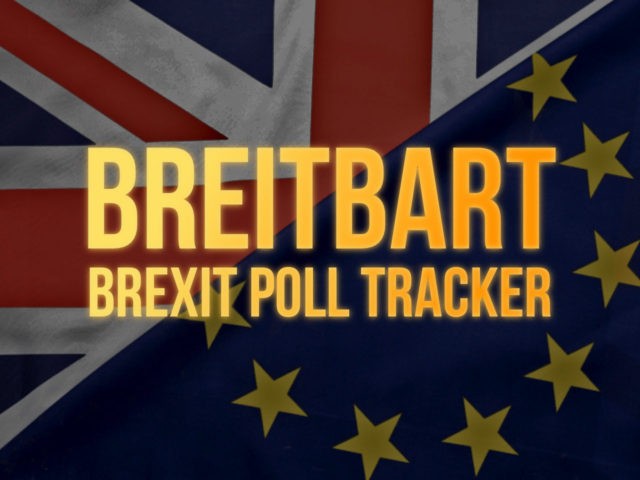
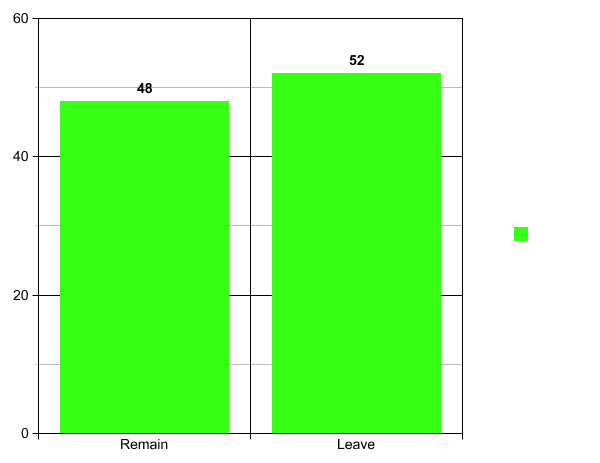
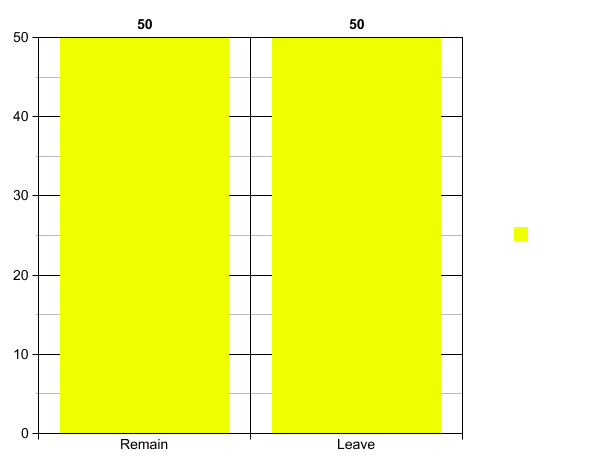
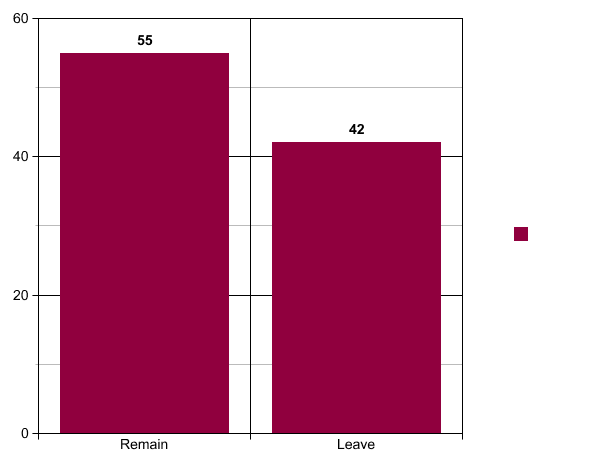
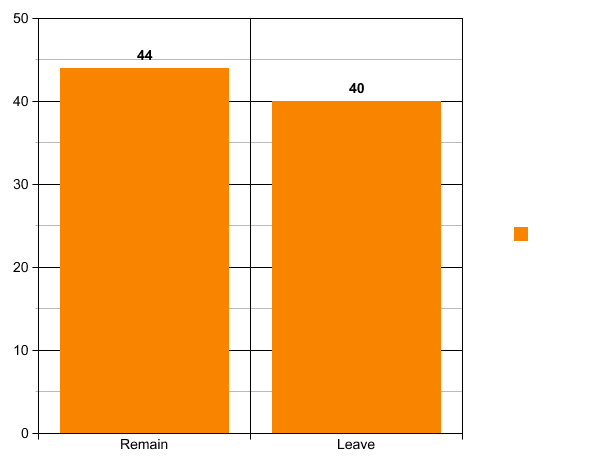
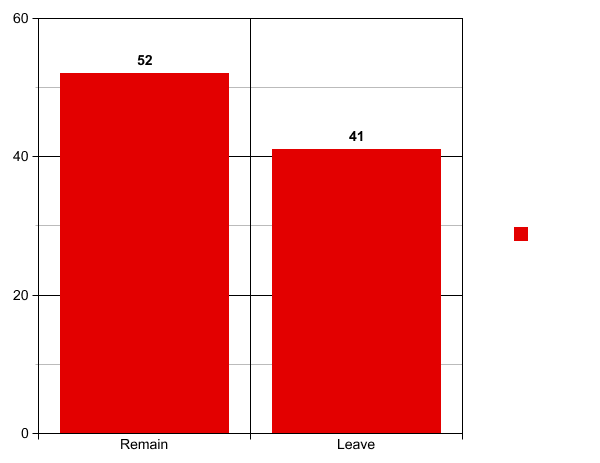
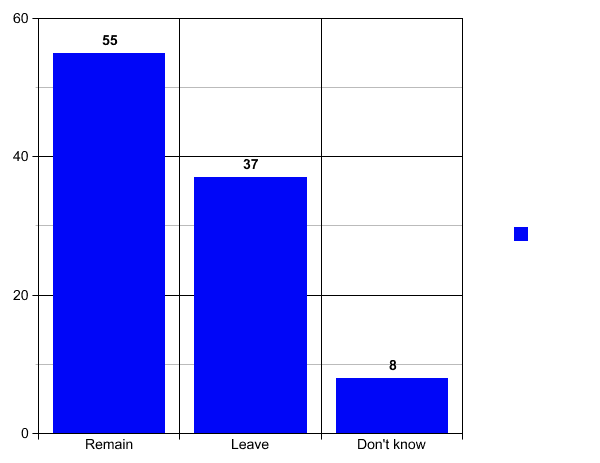
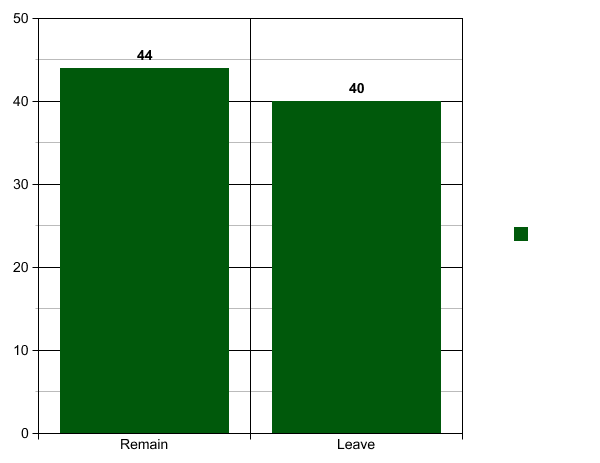
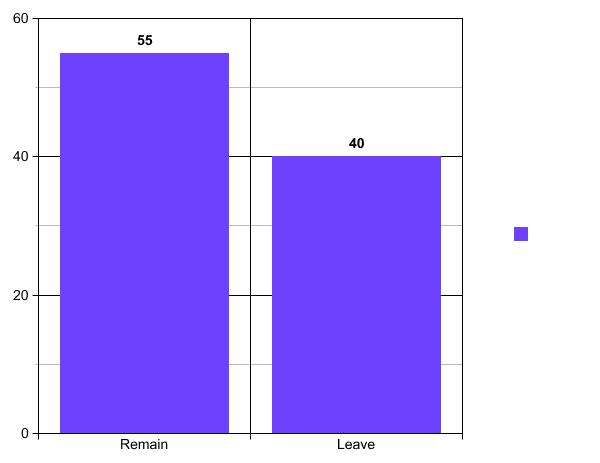
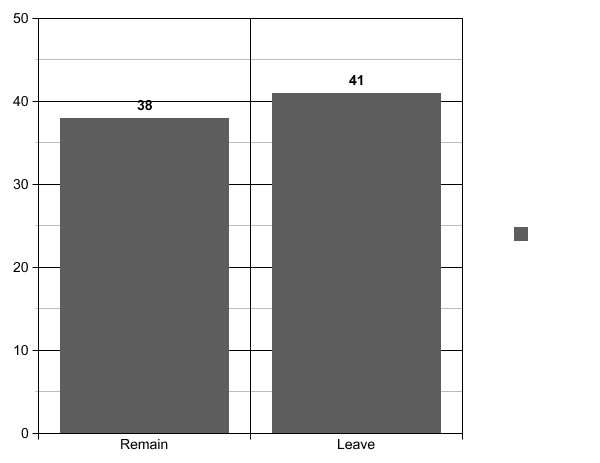
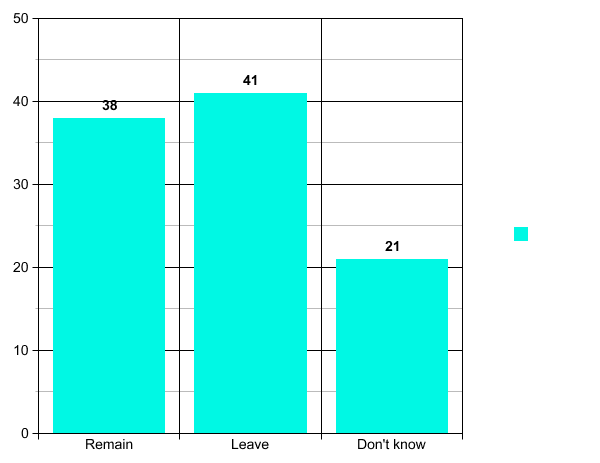
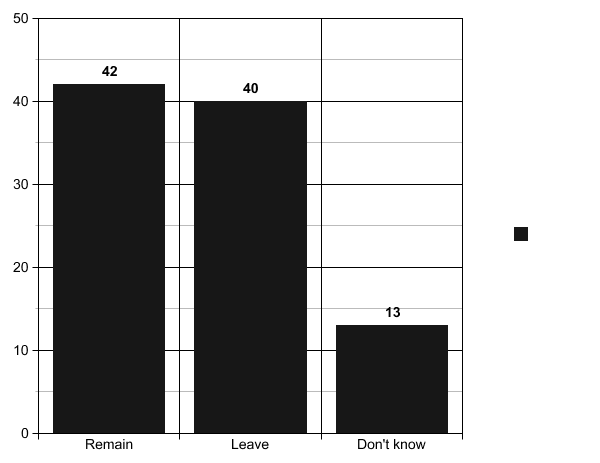





COMMENTS
Please let us know if you're having issues with commenting.